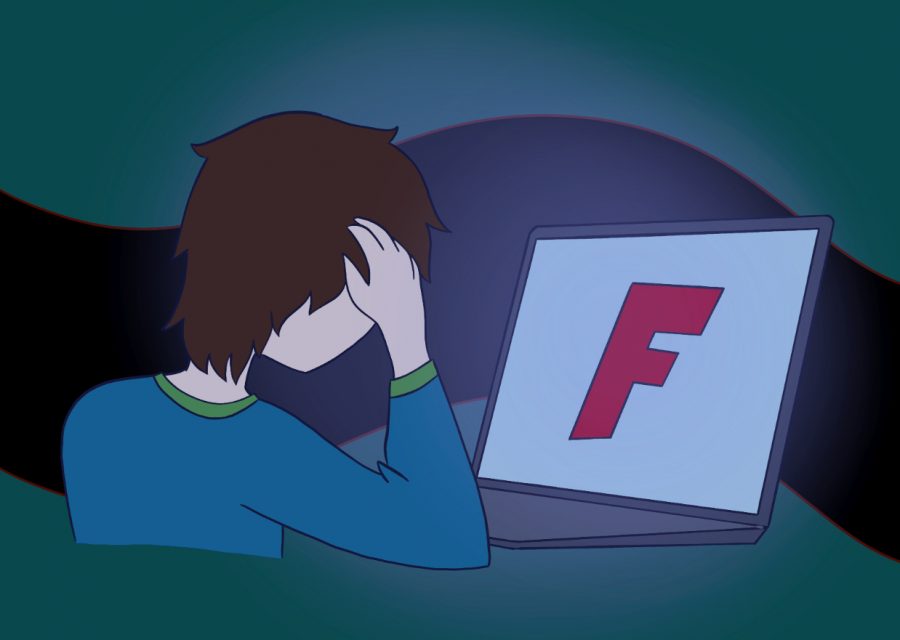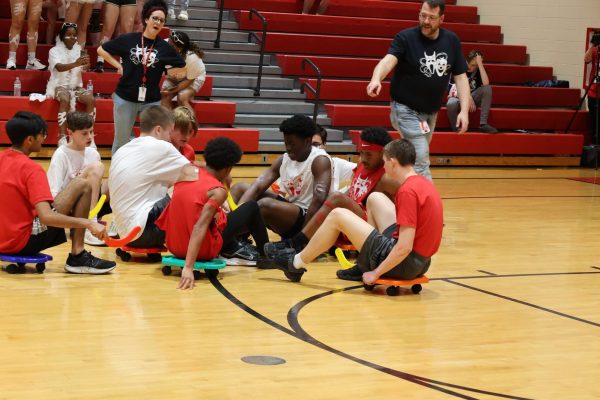Failing grades spike at RV during the pandemic
The stress of the pandemic has taken a toll on students and teachers alike, leaving administration to turn to intervention plans
January 26, 2021
Note: the students quoted wish to remain anonymous.
Note: transcribed quotes have been edited and condensed for clarity.
The anxiety-inducing assessments, along with the persistent distractions from constantly being home, now replace the twists and turns in the hallways at school, condensing the school year into a ball of stress and frustration with a desperate need to pass classes you would normally be fine with.
Once the COVID-19 pandemic began, RV, like most schools, was in a panic, trying to find out how to teach its students effectively without having them here in person. As the everlasting nature of the pandemic settled into both teachers and students, different methods of teaching began to emerge, though ultimately becoming one teaching system this semester. However, while these methods for teachers are easier and some students are managing, others are struggling, and even people who usually do well are almost failing their classes. The HS did a deep dive into academics, and here is how everyone is processing the spike in failure, from students, to teachers, to even administrators.
Students’ Perspective
The initial reaction a large number of students had towards their lower academic performances was mostly shock and disappointment in themselves.
“Doing worse in these classes made me feel like I was losing myself because I am usually a good student that stays on top of work,” said one junior who was struggling in English and health. “I felt helpless since every time I tried to fix my sleep schedule or stop feeling depressed, I would just become more depressed… It definitely was a quick, seemingly unpreventable, domino effect.”
The overall feeling of collapse many students are experiencing ruins their work ethic. But why exactly is there so much stress now due to online schooling? While there is a large number of distractions at home, students propose that there is a different reason as to why they are going through a stressful time.
“To the teachers’ credit, they are all trying to figure out this transition to online learning as well and all, in my experience, have had their moments of giving us a needed break or even allowing for late work past the typical three-day period,” said another junior experiencing issues in English, mathematics and the performing arts classes. “However, the majority of the time, the daily workload not only feels excessive but a contradiction of what they’ve assured us is a lesser amount of work for the course.”
While teachers are struggling during this time as well, and are offering help as necessary, the amount of work given tends to counteract the help provided to students. While it is beneficial that teachers are providing help when they can in the form of office hours and meetings, this continues to be an overwhelming time for everybody.
When provided with the concept of being able to change one aspect of virtual learning, a junior struggling in English said, “I definitely think the school day should be tailored for what fits the student better. We should still have a normal school day I think, but lessen the workload on students and actually care when they say that they’re struggling.”
The repetitious, day-in and day-out lifestyle experienced by students, especially due to the pandemic, stresses many out to the point where catching up is almost impossible. Many students claim that the work is the same amount as if it were a regular school year, and some students mention the stressful amount of work they currently have is already less than what the class would have offered. Additionally, students who are struggling claim to only occasionally receive some form of help, making it lackluster in effect. Though, there are many teachers who are also having issues of their own during the pandemic.
Teachers’ Perspective
While students are having issues in the pandemic, teachers are stumbling through this time as well. With there being almost a 10% failure rate in some classes at the time of this article’s publication, teachers have had to come up with ways to make class more digitally engaging. On top of the issues with engagement, the amount of distractions students have access to at home increases the difficulty of maintaining interest in class as if teaching was in person.
“I think a lot of these students have a troublesome time focusing on school expectations from home when there are so many overwhelming distractions, “said Mrs. Garvey, who teaches English II Accelerated and Honors. At some point, it just becomes so overwhelming to get caught up.”
A class can only be made so interesting before students begin to look at other things to get through the class, even at the cost of learning new and important content and skills. Moreover, teachers who provide office hours do not get many, if any, students who need to get help in their class, showing that some students just want to complete the class rather than understand some of the key skills and material.
Many teachers feel sympathy towards students as they grapple with rising mental health issues and face the prospect of losing an entire year (or more) of their high school experience.
“Of course I miss seeing the students in person, but I can’t imagine being a teenager and not being able to see my friends or not being given a normal chance to learn” stated history teacher Mr. Freitag. He urges students to stay strong, spend time with family and find positive methods to cope with the stress of the pandemic.
The mantra from the faculty concerning student well-bring seems to reiterate Mr. Freitag’s perspective. The current spike in failing students, though, has raised alarms in administrators who are trying to help.
Administrators’ Perspective
Administrators in RV have witnessed the slow rise of students’ low academic performance and sympathize with the students, similar to the teachers.
“There’s a lot of anxiety. Everybody is feeling it; they’re looking at their schoolwork and thinking ‘Oh, I need to help my brother’ or ‘I need to help my mom’ and it is just weighing on people,” said the Student Information Services Coordinator, Mrs. Sauter.
The Holly Spirit was denied access to specific data about student failure rates upon request.
Near the beginning of the year, the administration offered different ways for students to receive help, including National Honor Society tutoring and even ways for students to make up work that typically would not be able to be made up. Additionally, the possibility of a summer school for students–typically not offered at RV–is in the works. Around ten years ago, RV had a summer school for students who were working with teachers to pass different classes and not fall behind. Though summer school ended, the challenge the pandemic posed to students has led to its potential return.
“We haven’t put a lot of details about summer school since it is still kind of early, but years ago, when students would fail courses, we had a summer school,” said Mr. Connolly, the Director of Curriculum and Instruction. “The classes were two hours long, you could take two courses, and it was four weeks long.”
Though the details of the summer school are not yet finalized, the interest for a program like this is high. The length of time in summer school for students may not be as long as it used to be due to COVID restriction, but that does not mean a summer school cannot exist and that students could not recover missing credits.
The potential of the return of the NJSLA is another concern coming down the pike. Mr. Wence, an assistant principal, stated, “A few weeks ago, right before [winter] break, the education commissioner, Betsy DeVos, let all the states know that they are expected to do standardized testing this year. She has since resigned, and now… what she left us with before she quit was ‘You are going to have to test,’ we have a giant window from mid-March to mid-June where we can test all of the fall students and then all of the spring students. They did reduce the number of courses and people who have to take the test in NJ, though.”
Due to its absence for the last two semesters, its potential return could help gather statistics regarding how students nationwide are learning during the pandemic. Additionally, this may help with determining if failing students are failing due to not understanding the work or if it is just from the copious amount of stress coming from learning online and the homework that goes with it.
This pandemic has affected all of us in numerous ways. However, it does not make the year impossible to get through, as, despite all the hardships, it will only be temporary. Since the COVID vaccines are out, slowly, life could return to normal and the whole nightmare of a year will be over. It’s been troublesome but it will not last forever.













Nia • Jan 28, 2021 at 6:45 pm
Monica, this is amazing! The much needed teacher and administration perspective and detailed student perspective makes this article even better. Great job!